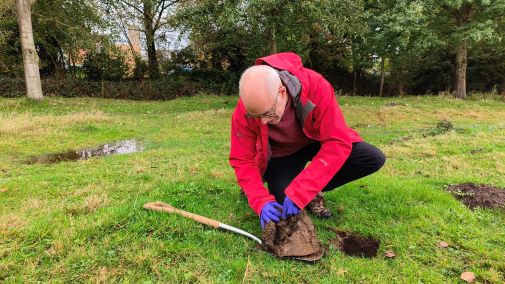University of York researcher explores how climate change and flooding is affecting earthworms
Posted on 20 October 2024
 Researchers are examining how the intensity, frequency and extent of flooding across the UK is putting earthworms at risk
Researchers are examining how the intensity, frequency and extent of flooding across the UK is putting earthworms at risk
Now, University of York researcher Professor Mark Hodson will look at how predicted increases in the intensity, frequency and duration of flooding is impacting the population.
Impact modelling
The ambitious research project is being announced ahead of this year’s World Earthworm Day, which is taking place on October 21st. The research will blend field sampling, laboratory experiments and modern modelling techniques over the next two years.
Researchers at the University of York will examine how the intensity, frequency and extent of flooding across the UK are likely to put these vitally important creatures at risk. The study will also explore how the changes to earthworm habitats are affecting soil health which is linked to biodiversity, ecological systems and even the growth of food on farms.
Flooded soils
Academics know flooding in the UK is getting worse, and climate change is partly responsible. This study will help them know what kind of impact this can have on earthworm numbers and their health because the creatures simply cannot survive in flooded soils.
Professor Mark Hodson, a soil scientist from the University of York’s Department of Environment and Geography, said: “This research will help us understand how climate change and flooding is affecting the lives of earthworms, which is so important because earthworms are an integral part of how healthy our soils are. This pioneering research will integrate new knowledge into earthworm flood risk maps that show the vulnerability of our all important earthworm populations to climate change driven changes in flood extent, frequency and duration.”
Survival chances
Earthworms create networks of tunnels that promote drainage and aeration and, just like humans, breathe oxygen, but they don’t have lungs and actually breathe across their skin.
The creatures can survive in water provided that the water contains enough oxygen, but within hours flooded soils can become oxygen deficient and earthworms drown.
Outpacing floods
Professor Hodson added: “Earthworms won’t just wait in the soil as the flood waters rise. Earthworms are sensitive to soil moisture contents; as soils become wetter they could try to move away to drier soil. So we’re also going to investigate how wet a soil has to get before earthworms start to move to more favourable conditions, and whether they can move fast enough to outpace the flood waters.
“If the worst happens and the earthworms drown, their cocoons (earthworm eggs) will still be in the soil. Once the flood waters recede, the cocoons could hatch, replenishing the earthworm population. Another aspect of our study will be to determine whether reductions in oxygen concentrations in the soil during flooding damages the cocoons and reduces their hatching rate.”
Species specific
Previous York research has found that the threshold oxygen concentrations at which earthworms drown vary between species, but academics do not know exactly why this is. Likely possibilities include differences in their haemoglobin and their ability to aestivate, which means entering into a period of prolonged dormancy and reduced metabolic rate and hence oxygen demand.
As different species of earthworm affect soil properties and function differently, changes in earthworm communities, due to variable survival in flooded soils could in turn impact soil.
Ecosystem heroes
Earthworms are valued by gardeners and farmers alike. They can boost plant growth by up to 30% and it has recently been suggested that earthworms are responsible for 6.5% of global grain production.
Professor Hodson is being joined by ecologist Ben Pile, environmental physiologist Michael Berenbrink from the University of Liverpool and hydrologists Megan Klaar and Tom Willis from the University of Leeds in conducting the research. It is being funded by the Leverhulme Trust.
Understanding complexity
Dr Klaar, a natural food management expert and Associate Professor, at the University of Leeds, said: “This research is all-important for understanding the complexity of soil health on a changing planet.
“We hope this study will help us understand more about how nature is interconnected to climate change and flooding - contributing to the development of more resilient communities. Celebrating World Earthworm Day is an ideal way to get started on this.”
Explore more news

Researchers use robotics to find potential new antibiotic among hundreds of metal complexes
Tuesday 23 December 2025

Text messages could be key to helping TB patients quit smoking, according to study
Monday 22 December 2025

Teenage niece may have shaped Jane Austen’s Persuasion, new study suggests
Monday 22 December 2025

Project to examine how AI is changing the way science is done
Wednesday 17 December 2025

Researcher leads global push to cut tobacco harms in people with mental ill health
Monday 15 December 2025
Media enquiries
About this research
The project is funded by the Leverhulme Trust.
